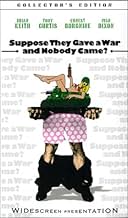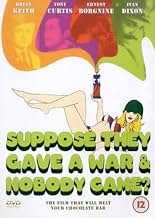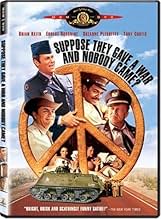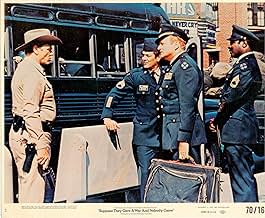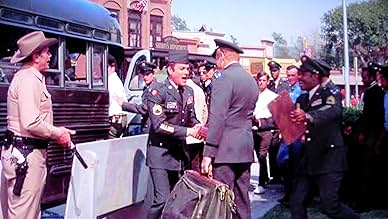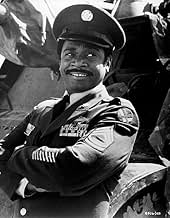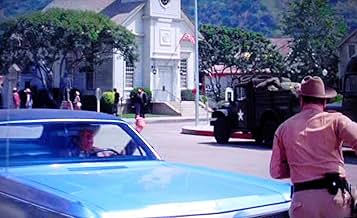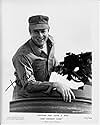NOTE IMDb
5,4/10
457
MA NOTE
Ajouter une intrigue dans votre langueTensions grow between the small army base and people from the nearby town. Despite well intentions of people from both sides it all escalates after the big dance in town.Tensions grow between the small army base and people from the nearby town. Despite well intentions of people from both sides it all escalates after the big dance in town.Tensions grow between the small army base and people from the nearby town. Despite well intentions of people from both sides it all escalates after the big dance in town.
- Réalisation
- Scénario
- Casting principal
Robert Emhardt
- Lester Calhoun
- (as Bob Emhardt)
Cliff Norton
- Herman Hyde
- (as Clifford Norton)
Avis à la une
As a 20 year Military veteran, I was attracted to the intriguing question that is the title of this movie. Deciding whether or not to watch it becomes a no-brainer when you see the list of names that make up the ensemble of the cast: Ernie Borgnine, Ivan Dixon, Don Ameche, Art O'Connell and the great John Fiedler are all solid actors and have appeared in some of the best films in the history of American cinema. (check out their collective credits if you doubt it.)
This film is an underrated one in the canon of films dealing with the U. S. Military. The script, although not perfect, is well written, with subtle and witty commentary on the military hierarchy, prevailing social attitudes, and the precarious relationship between our Vietnam-era military and the civilian community (i.e. "community relations"). No heavy military rigidness here; the flow is free and easy as in 'Catch-22' to provide a frame of reference. Or, as Stephen Sondheim wrote around the same period in "Anyone Can Whistle," the 'laugh at the Kings, or they'll make you cry' approach.
As would be expected, Brian Keith is solid, but surprisingly even Tony Curtis manages to turn in a relatively piped-down performance from his usual fare which, to quote America's best known homemaker Martha Stewart, 'is a good thing.'
This film is an underrated one in the canon of films dealing with the U. S. Military. The script, although not perfect, is well written, with subtle and witty commentary on the military hierarchy, prevailing social attitudes, and the precarious relationship between our Vietnam-era military and the civilian community (i.e. "community relations"). No heavy military rigidness here; the flow is free and easy as in 'Catch-22' to provide a frame of reference. Or, as Stephen Sondheim wrote around the same period in "Anyone Can Whistle," the 'laugh at the Kings, or they'll make you cry' approach.
As would be expected, Brian Keith is solid, but surprisingly even Tony Curtis manages to turn in a relatively piped-down performance from his usual fare which, to quote America's best known homemaker Martha Stewart, 'is a good thing.'
It's hard to sink low in Hollywood, but one way is to lead people on that you are making some sort of "profound" anti-war, anti-racism message movie, only to produce a really shallow, laughable at, not with, military comedy. Since they used a then popular antiwar slogan as the title and had a "long haired" soldier walk down the road with a peace sign painted on his duffel bag, it is really insulting that this movie, made during the height of the Vietnam War and protests, DIDN'T EVEN mention the war. OK, they DID, sort of, when Brian Keith told a story about one his men who got shot their in 1956??(Did he transfer from the French Army?) It acted like this was just a peacetime military base with a minor social, public relations problem with their local redneck civilian community. It was set in the South, but the architecture and landscape suggested, guess, Southern California.
It also tried to play up the racial angle, which it did a tad more successfully than the anti-war angle, only to submerge it into the townies versus the garrison plot element. It had a pretty good cast, except for some sloppy brat pack boozy acting by Tony Curtis. Even some of the dialog was good. But when you add the childish mash up scene at the end along with the cheap pseudo messaging in the movie's theme, it is a real dud. It is like an (almost) adult version of McHale's Navy, except McHale is playing one of Captain Binghampton's enforcers; the stock redneck Southern sheriff.
It also tried to play up the racial angle, which it did a tad more successfully than the anti-war angle, only to submerge it into the townies versus the garrison plot element. It had a pretty good cast, except for some sloppy brat pack boozy acting by Tony Curtis. Even some of the dialog was good. But when you add the childish mash up scene at the end along with the cheap pseudo messaging in the movie's theme, it is a real dud. It is like an (almost) adult version of McHale's Navy, except McHale is playing one of Captain Binghampton's enforcers; the stock redneck Southern sheriff.
I saw this film in 1970 as a sneak preview at the Shores Theater in Miami Shores, Florida. My dad had been an infantry sergeant and was awarded a Silver Star Medal in World War II. He liked the film only because it had some of the actors he liked, Tony Curtis and Brian Keith among others. We both agreed the movie couldn't figure out what it wanted to be, a comedy or a serious film. We assumed it was not only an anti-war film, but an anti everything film. Most of the main characters were far from likeable and it seemed everyone was angry, embittered, sarcastic, anti social and bigoted. Only interesting if you're a big enough fan of the cast, not much else.
I remember watching this as a child at the theater and then on TV (called "War Games") and have not seen it since the mid 70s and miss it. What appealed to me most was the recreation of the Civil War, where again, the American Yankees are forced into war and have to confront bigoted anti-American Southerners. The movie seems to poke fun at the sore losers of a war fought in the 1860s. You cannot help but cheer as a few Yankees take on a half-witted army of a Southern Sheriff as they plow into town riding an old World War 2 M-7 self-propelled artillery gun to liberate a friend from the jail. Compusive actions, however, must not go without consequences. What a funny movie with a good cast.
"Suppose They Gave a War and Nobody Came" (1970) is a comedy/drama that details events in remote southern Arizona when militarists at an Army base (Tony Curtis, Brian Keith, Bradford Dillman & Ivan Dixon) conflict with the authorities of the nearby town (e.g. Earnest Borgnine) eventually leading to all hell breaking loose when a couple of disenchanted soldiers steal a tank.
This is a dialogue-driven dramedy stuffed with understated witticisms hidden within the verbiage; so I suggest using the subtitles to catch 'em all. The highlight is the great cast, but curvy cutie Suzanne Pleshette isn't used enough. An additional attraction is that this is a great way to go back in time and observe American society in 1969 (when the film was shot).
The producers were shooting for the tone of the contemporaneous "Kelly's Heroes" transplanted to late 60's America. Unfortunately, the script needed a rewrite to flesh out more entertaining prospects. It's a flat viewing experience as is. Eastwood's "Heartbreak Ridge" took elements of it and made a better flick. Not that "Heartbreak" is great or anything, but it's superior to this.
The film runs 1 hour, 53 minutes and was shot at Fort Huachuca, Arizona, with some scenes done at Warner Brothers Studios, S. Cal. Don Amech and John Fiedler also appear.
GRADE: C
This is a dialogue-driven dramedy stuffed with understated witticisms hidden within the verbiage; so I suggest using the subtitles to catch 'em all. The highlight is the great cast, but curvy cutie Suzanne Pleshette isn't used enough. An additional attraction is that this is a great way to go back in time and observe American society in 1969 (when the film was shot).
The producers were shooting for the tone of the contemporaneous "Kelly's Heroes" transplanted to late 60's America. Unfortunately, the script needed a rewrite to flesh out more entertaining prospects. It's a flat viewing experience as is. Eastwood's "Heartbreak Ridge" took elements of it and made a better flick. Not that "Heartbreak" is great or anything, but it's superior to this.
The film runs 1 hour, 53 minutes and was shot at Fort Huachuca, Arizona, with some scenes done at Warner Brothers Studios, S. Cal. Don Amech and John Fiedler also appear.
GRADE: C
Le saviez-vous
- AnecdotesThis was Don Ameche's last film until Un fauteuil pour deux (1983) 13 years later.
- Citations
Shannon Gambroni: Machines are like broads, built to be had.
- ConnexionsReferenced in Fleshpot on 42nd Street (1972)
Meilleurs choix
Connectez-vous pour évaluer et suivre la liste de favoris afin de recevoir des recommandations personnalisées
- How long is Suppose They Gave a War and Nobody Came?Alimenté par Alexa
Détails
- Date de sortie
- Pays d’origine
- Langue
- Aussi connu sous le nom de
- Suppose They Gave a War and Nobody Came
- Lieux de tournage
- Fort Huachuca, Arizona, États-Unis(Exterior)
- Société de production
- Voir plus de crédits d'entreprise sur IMDbPro
Contribuer à cette page
Suggérer une modification ou ajouter du contenu manquant

